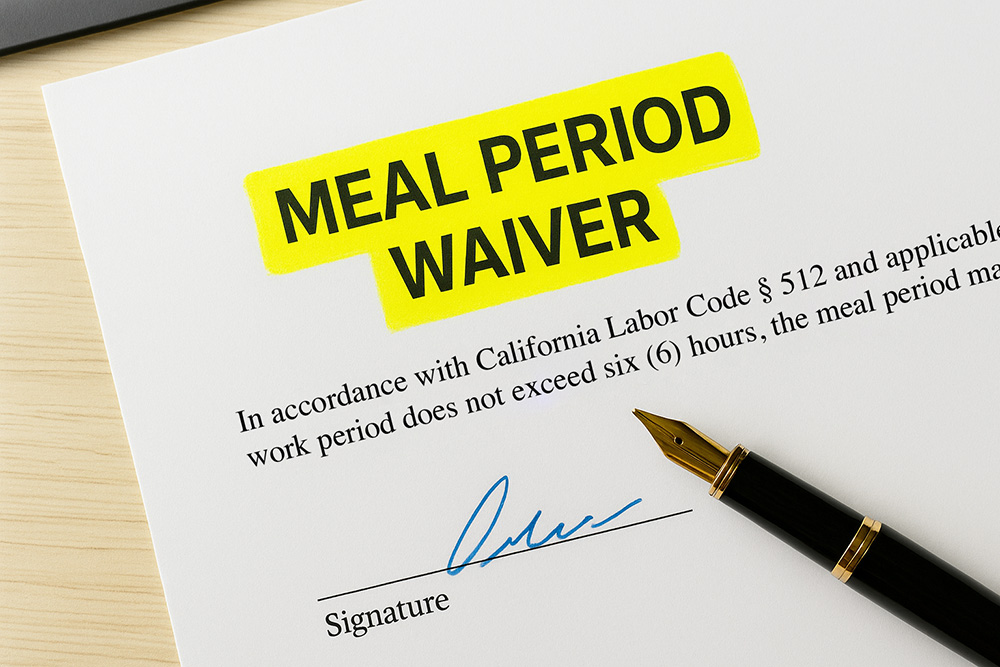Prospective Meal Period Waivers: Court of Appeal Finds No Beef with Skipping Lunch If Voluntarily Waived in Advance Via a Clear, Revocable Agreement
August 19, 2025 | Employment Articles

California employers navigating the state’s complex meal period requirements received useful guidance in a recent appellate decision. In Bradsbery v. Vicar Operating, Inc. (2025) 110 Cal.App.5th 899, review denied July 2025, the Court of Appeal for the Second District held that written waivers of meal periods executed in advance of shifts are legally valid when made voluntarily and subject to revocation.
Bradsbery helps resolve whether a revocable written waiver of a meal break can be signed at the start of employment and applied prospectively. According to the Court, the answer is yes, provided there is no evidence that the waivers are unconscionable or unduly coercive.
The Dispute
The plaintiffs in Bradsbery were two former employees of a veterinary hospital chain who brought a class action alleging, among other things, violations of California’s meal period rules. They claimed their employer failed to provide meal periods for shifts exceeding five hours and that the use of advance meal break waivers was improper.
Each plaintiff had signed a written waiver acknowledging the right to a 30-minute meal break for shifts over five hours but choosing to waive that right for any shift six hours or less. The waiver explicitly allowed revocation at any time with written notice. Importantly, plaintiffs did not allege coercion to enter, lack of understanding of, or inability to revoke the waiver.
The Basic Legal Standards and Plaintiffs’ Core Arguments
Under Labor Code section 512 and Industrial Welfare Commission (“IWC”) Wage Orders Nos. 4 and 5, employees are generally entitled to a 30-minute unpaid meal period after five hours of work and a second meal period after 10 hours worked. But, both the statute and wage orders include an exception: if the shift does not exceed six hours, the meal period may be waived “by mutual consent.”[1] Plaintiffs argued that this “mutual consent” must occur at or near the time of each shift. They contended that allowing a waiver to apply automatically to future shifts would undermine the statutory purpose of protecting employee welfare and encourage routine denial of breaks.
The Court’s Reasoning
The Court of Appeal disagreed, emphasizing that neither the statutory language nor the relevant wage orders prohibit prospective waivers. The Court reviewed the legislative and regulatory history of California’s meal period rules and found consistent support for flexibility, especially for shorter shifts where the health and welfare concerns tied to meal periods are less pronounced. The Court found the revocable nature of the employer’s agreement important, particularly in the absence of any argument or evidence that the waivers were involuntary, misleading, or concealed.
The Court distinguished Bradsbery from existing authority by noting that, unlike existing authorities, the facts and arguments in Bradsbery address the timing and circumstances under which a waiver must be executed.
Bradsbery affirms that voluntary, clear, and revocable meal period waivers can serve both employee choice and employer legal compliance.
Employer Takeaways
A meal period waiver agreement should be a standalone document that clearly states:
- It is an agreement to waive meal periods;
- Employees are not required to waive their meal periods;
- Employees will not be retaliated against if they decide not to waive their meal period(s); and
- Employees are allowed to revoke the waiver at any time.
The waiver must not be: (1) obtained by employer pressure on or coercion of the employee to sign, or (2) presented under circumstances that may allow an employee to state that the employee did “not understand” what he or she was being asked to sign.
Whether employee meal period waivers or arbitration agreements, California employers are facing an uptick in former employees challenging agreements due to the circumstances under which the employee was presented an agreement for review and signature (e.g., the agreement was “buried in a sea of papers that all looked the same” or the “agreement was not presented in the employee’s native language, but rather in only English.”)
[1] Historically, the law has also allowed waiver of a second meal break only if the first meal period was not waived by the employee.
Subscribe to our Blogs
Get notified when new posts are published.

